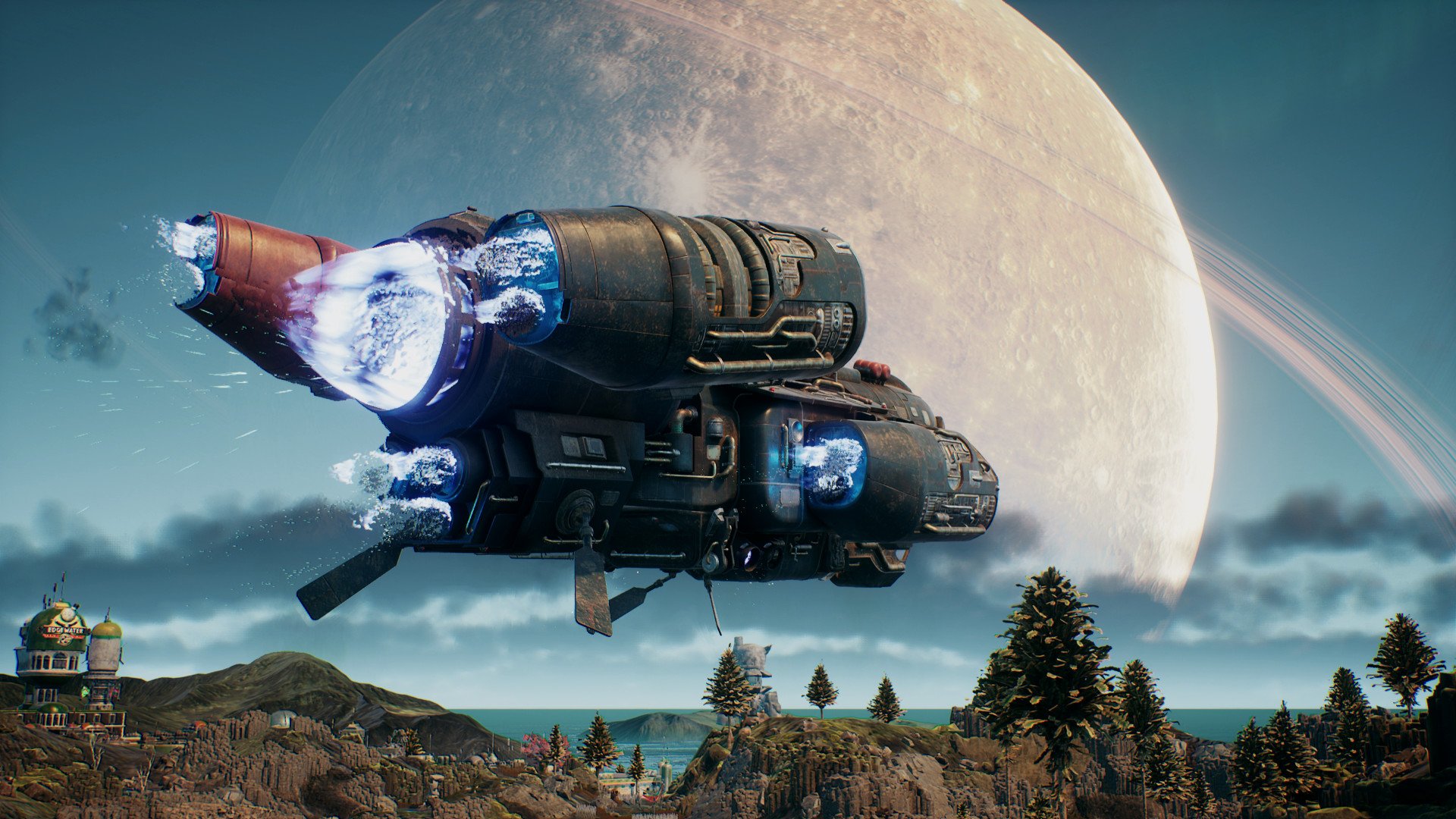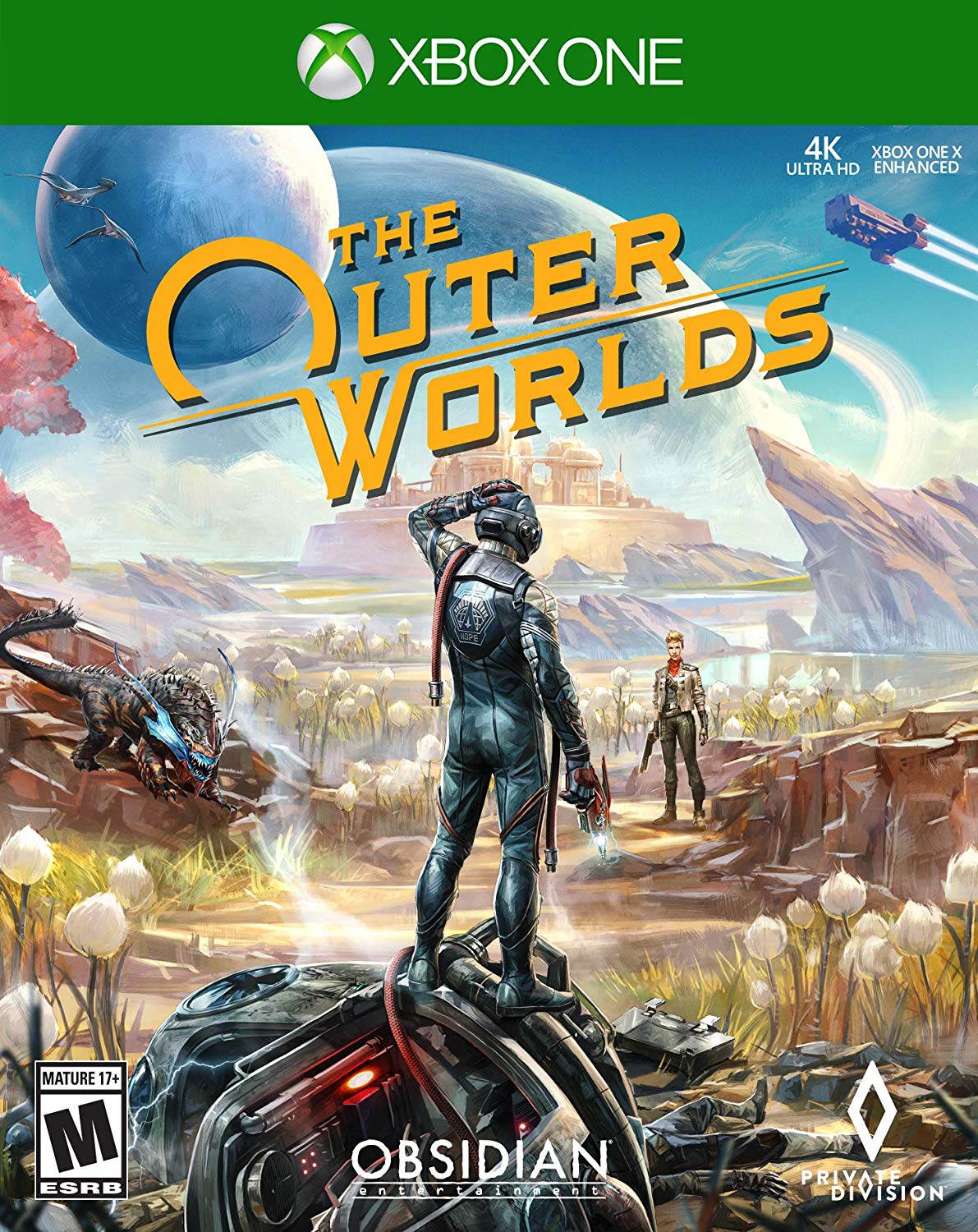The Outer Worlds Xbox One review: This maiden voyage is an instant classic

The Outer Worlds launches on Oct 25, 2022, and as I write this, I literally only got finished with the story.
Gear up a few hundred years in the hereafter, 10 Earth corporations pooled their resource and purchased an entire solar system, shipping out several colony ships with the aim of building up an all-new abode away from World. Equally you might expect, things didn't exactly go to programme.
The Outer Worlds is an utterly tremendous achievement that showcases the best of Obsidian'southward writing wit, globe-building detail, and character focus. The game borrows heavily from other major honey RPG franchises that take fallen out of favor with shareholders in recent years, which is perhaps ironic given the game's extreme-Capitalism plot beats. Obsidian fills that forgotten niche with confidence and rigor.
Here's everything awesome (and not so awesome) virtually The Outer Worlds, the most exciting new IP in years.
Out of this world

The Outer Worlds
$lx
Bottom line: While crude around the edges, The Outer Worlds journeying across the stars is an instant-classic RPG fans cannot miss.
Pros:
- Excellent RPG shooter combat
- Bulky 30-hour story
- Incredible, witty writing
- Sense of humor derrived from the plot, rather than memes
- World-class world-building
Cons:
- Collection of quality-of-life problems
- Odd difficulty curve
- A.I. is questionable
- Exterior of conversations, NPCs are quite lifeless
Stunning world, gainsay, and characters
What I loved about The Outer Worlds

The Outer Worlds feels like the culmination of years of Obsidian Amusement feel with RPGs, from Knights of the One-time Republic Two to Fallout New Vegas. What the studio has put together here has some rough edges, but here'due south why I think it'southward the nearly exciting new IP in years.
| The Outer Worlds |
|---|
| Genre | Sci-fi RPG |
| Players | Unmarried player |
| Developer | Obsidian Entertainment |
| Microtransactions | No |
| Xbox Game Laissez passer | Yes, PC and Xbox |
| Launch date | October 25, 2022 |
| Launch platforms | PS4, Xbox, PC |
| Price | $60 |
Bethesda and Bioware, known for games similar Skyrim and Mass Event oft feel like they've taken a footstep back from the very thought of a unmarried-histrion RPG, urged by shareholders to chase multiplayer greenbacks cows. In that location's been a slight void in the market for an RPG on this level where your choices truly matter, and Obsidian is filling it with confidence and rigor.
Set a few hundred years in the future, several corporations banded together and purchased the Halcyon solar organization, aircraft huge colony ships across the galaxy to reach it. As a member of one of the hitherto lost colony ships, The Hope, you're unceremoniously revived out of hibernation by what tin can but be described as a mad scientist, then dropped out of space on the surface of a colorful alien world. The opening is equally hilarious as information technology is disorienting.


Obsidian'due south writing shines through as The Outer World's all-time characteristic. From the most minor side quests to grand finales, Obsidian had me roiling in laughter, sickened with disgust, and perplexed by deep philosophical discussions between the game's surprisingly fleshed out fictional religions. Much of The Outer Earth's marketing has revolved effectually the game's humor, and of that at that place is enough. It lures yous into a false sense of security, even so. Make no mistake, The Outer Worlds can get extremely dark, extremely fast. It'll sucker-punch yous, and leave a lasting impression.
The earth-building is simply excellent here, with Obsidian really flexing its experience to build something that fans of Firefly and Cowboy Bebop will utterly adore. Halcyon's colonies are trapped in a capitalistic hell, where corporations literally rule.

Indentured servitude has been religiousized, nigh, every bit each colony you visit is besieged by various problems. Roaming deserters and marauders, hungry alien monsters, and worker droids gone haywire. You'll travel across various colonies in various states of busted, unlocking the secrets of the mysterious Halcyon Board that controls everything.
The Outer Worlds marries shooter combat with RPG mechanics more elegantly than many other similar games.
Along the way, you'll meet comrades and enlist them (or pass up them) into your squad, making the journeying all the more rewarding. SAM the repurposed sanitation droid that now spews acrid, instead of soap, hell-bent on eliminating "germs." Ellie, the delinquent-turned-pirate, and Vicar Max, who reads his enemies their last rites before shotgunning them in the face. Each companion has their own quests and quirks to solve, and will bicker and barrack among themselves forth the way.
The Outer Worlds approach to combat has some rough edges (which I'll go over in the next section), but I'd argue that The Outer Worlds marries shooter gainsay with RPG mechanics more elegantly than many other similar games that take attempted it.
As a side effect of the hibernation process, the player character perceives time a little differently. Time dilation allows you to slow downwards the action, and target specific body parts manually for unlike effects. Cripple legs to make enemies motility slower, blind them with a headshot, or disarm them by shooting their hands. If you choose to gyre with companions, they can provide tactical support with their unique abilities which accuse on a cooldown. The SAM droid can employ his rocket boosters to slam downwards on enemies, creating an surface area stun effect, for example. These abillities add some depth and tactical play to proceedings, which tin can be crucial on higher difficulties.
Structurally, The Outer Worlds takes place beyond various broad open up spaces. Monarch is by far the largest, complete with large city settlements, abandoned colonies and plains full of roaming monsters. Some of the side missions take place in smaller locales, which yous can access via your personal ship — The Unreliable. Yous can skip a lot of the side missions and head straight to the stop, but the game will exist nowhere near as rich for those who blitz. The epilogue guides you through the long-term effects of every decision yous've fabricated throughout the game, subsequently all, then be sure to take your time.

The Outer Worlds is the first shooter in what feels like an incredibly long time where your choices really matter. You tin can choose to persuade, intimidate, or lie your way to improve rewards or new story paths, while betraying or supporting various factions. There are plenty of grayness areas, morally, when it comes to your decisions, and your choices ultimately shape what sort of colony Halcyon will become.
Obsidian'southward writing shines through as The Outer Earth's best feature.
It's rare that I find myself longing for more after finishing a game nowadays, in an age of perpetual service-driven experiences. The Outer Worlds feels as one-time school equally it comes in that respect. I adored every moment of my time in Halcyon, blasting bandits into bloody chunks, warping gravity with the game's unique "Science" weapons, and watching heads burst in slow motion.
There is no question in my heed that The Outer Worlds represents an instant classic, simply similar many of those Xbox 360-era RPGs we remember fondly in 2022, there is quite a collection of annoyances worth addressing.
UI, A.I., and physics oddities
What I disliked about The Outer Worlds

I'm happy to to forgive The Outer Worlds for nigh of these, as reading my list of grievances in my notes feels like a listing of nitpicks rather than genuine problems, peculiarly since most could easily be patched. The first entry in a new IP is ever going to have pain points hither and there, but The Outer Worlds has quite a few oddities that I hope Obsidian tin address either in patches, or in futurity sequels (and oh my God, please make a sequel).
Outside of chat dialogue, The Outer Worlds' cities and townships can feel a little robotic. NPCs walk effectually and discuss your deeds and decisions, which is awesome. All the same, they only really stand around, feeling like props, rather than living entities. It undermine's the game's environmental blueprint, which is otherwise staggeringly proficient.

In terms of combat, many of The Outer Worlds' kill cameras just, fail, nigh of the time. Vicar Max's shotgun scenes are almost certain to drop the camera behind a rock or something, obscuring your view of the fun. It likewise doesn't help that companion abilities have this trend to target friendly NPCs, unintentionally, which often comes with dire consequences.
The enemy/companion A.I. isn't that great either, with NPCs generally running into the open up, without whatever concept of taking cover or avoiding fire on the ground. You lot can, at least, control your own NPCs with handy commands, which elleviates some of these problems.
Outside of conversation dialogue, The Outer Worlds' cities and townships can feel a little robotic.
Some of the weapon's visual effects are far besides large and bright at times, which betrays the whole point of having slow motion kills. If I can't see the effects of my slick deadening motion skillz because they're subconscious behind a gigantic red flash, what is the betoken? Also the gore mechanics experience quirky and inconsistent. Sometimes, a sniper shot to the breast has caused a target's arms and legs to autumn off, which while hilarious at starting time, is a piffling scrap odd because that information technology can be rare, even with maxed out rifle skills, to produce a skull-popping headshot.
The other annoyances pertain to the UI. Scrolling effectually the map on controller is painfully slow and pasty, and the fact you tin can't rail multiple quests at once forces you into the menus far more often than I'd like. The Outer Worlds also suffers from what I'll call Prey Syndrome, where completing belatedly-phase side quests requires you to fast travel effectually the entire organisation, with interim space trips, producing a parade of loading screens.


The ability to stack quests would've helped with that sensation. I'm also non a huge fan of the game'south medical inhaler, which serves as your primary method for health replenishment. The mechanic itself is great, but you lot have to constantly dive back into the menus to restock it with raw materials, which I experience could've been implemented without having to enter the principal inventory screen to manage.
None of these issues really hindered my enjoyment of the game, however. I didn't come across any operation issues, bugs, or other arrangement-level problems. Dare I say it, for the near part, Obsidian managed to build a polished game.
Should yous buy The Outer Worlds?
The Outer Worlds is a tremendous RPG that feels similar the culmination of Obsidian's efforts with similar franchises over the years. Equally a fan of classic Bioware and Bethesda RPGs, The Outer Worlds not only scratches the itch, just exceeds the legacy of the titles it draws inspiration from in some ways.
With an intriguing world ripe for expansion, tight combat, and a meticulous focus on earth-building, The Outer Worlds is an instant classic well worthy of any RPG fan's time.
Instant classic

The Outer Worlds
Most-exciting new IP in years
The Outer Worlds is a footling rough around the edges similar to its ragtag coiffure of heroes, but information technology's not for lack of center and soul. The Outer Worlds is a tremendous journeying across an unabridged star system RPG fans tin can't miss.
Nosotros may earn a commission for purchases using our links. Acquire more.
Source: https://www.windowscentral.com/outer-worlds-xbox-one-pc-review
Posted by: turpinbaxt1992.blogspot.com


0 Response to "The Outer Worlds Xbox One review: This maiden voyage is an instant classic"
Post a Comment